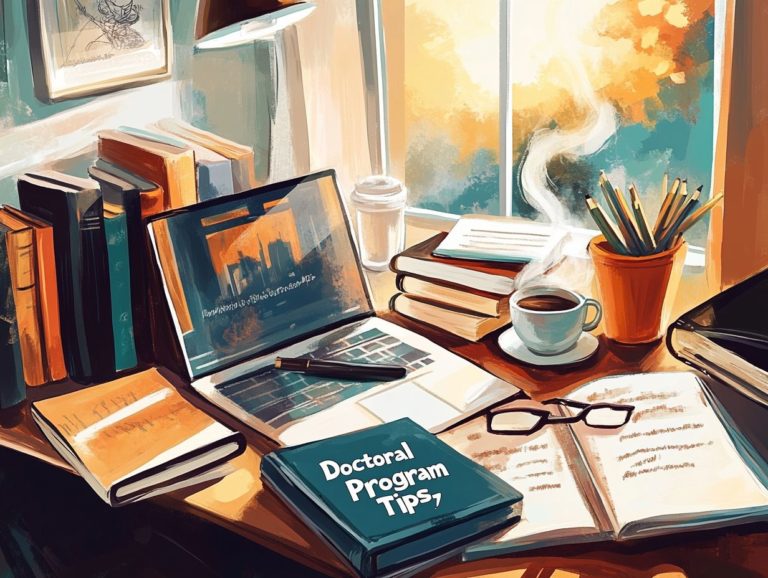How to Prepare for Doctoral Comprehensive Exams
Doctoral comprehensive exams can feel like a challenging part of your academic journey, representing a pivotal evaluation of your knowledge and readiness for the next stage of your studies.
This guide illuminates the purpose and format of these exams, empowering you to create an effective study plan while leveraging the resources at your disposal.
You ll discover strategies for success, including efficient study techniques and methods to manage stress and anxiety. You ll also find valuable tips for test day and insights on interpreting your results.
Get ready to conquer this challenge with confidence and enthusiasm!
Contents
- Key Takeaways:
- Understanding Doctoral Comprehensive Exams
- Preparing for the Exams
- Conclusion
- Utilizing Resources and Support
- Strategies for Success
- Taking the Exams
- Dealing with Results
- Frequently Asked Questions
- What are doctoral comprehensive exams?
- How can I prepare for doctoral comprehensive exams?
- What should I expect during doctoral comprehensive exams?
- How can I stay organized while preparing for doctoral comprehensive exams?
- What are some effective study strategies for doctoral comprehensive exams?
- What can I do if I feel overwhelmed while preparing for doctoral comprehensive exams?
Key Takeaways:

- Know the purpose and format of the doctoral comprehensive exams.
- Create a detailed study plan.
- Use effective study techniques and manage stress.
Understanding Doctoral Comprehensive Exams
Understanding doctoral comprehensive exams is essential for you as a graduate student pursuing a Ph.D. These exams evaluate your knowledge and readiness to defend your doctoral thesis.
In the United States, comprehensive exams represent a crucial milestone that determines your ability to advance in your academic journey. By exploring various research methodologies such as qualitative (focused on understanding), quantitative (involving numbers), and mixed methods (a combination of both) you can prepare yourself for the challenges these exams present, which typically include both written and oral components.
Excelling in these assessments can profoundly impact your academic trajectory and bolster your confidence in your field of study.
Purpose and Format of the Exams
The purpose of comprehensive exams is to assess your understanding and readiness for your doctoral thesis. They cover a wide array of relevant topics in your field.
These examinations typically come in two distinct formats: written and oral, each designed to evaluate your grasp of your discipline in unique ways.
The written component allows you to delve deeply into theories and methodologies, challenging you to synthesize information and showcase your critical thinking skills. The oral examination offers you the chance to articulate your thoughts verbally, fostering a dialogue with faculty that can reveal the nuances of your understanding.
Faculty meetings to discuss your performance are crucial in this evaluative process. This ensures a holistic assessment that considers various perspectives on your readiness to advance in your academic journey.
Preparing for the Exams
Preparing for comprehensive exams calls for strategic planning and effective study habits, transforming the often overwhelming study experience into a structured and manageable journey.
By approaching your preparation with intention, you can navigate the complexities of the material with confidence and clarity.
Creating a Study Plan
Creating a study plan is essential for effective exam preparation. It allows you to organize your study materials and allocate sufficient time to each subject area.
By incorporating structured time management techniques, you can ensure that each study session is both focused and productive. This includes setting specific goals for each session, using tools like calendars or digital planners to track your progress, and establishing a routine that balances study time with short breaks.
Integrating organized study materials such as notes, textbooks, and practice exams will streamline your information retention. Aligning these strategies with targeted exam preparation tips not only reinforces the material but also builds the confidence you need to tackle those final assessments head-on, ultimately leading to a more efficient and relaxed approach to learning.
Conclusion
In summary, preparing for your doctoral comprehensive exams requires understanding their purpose, creating a solid study plan, and effectively managing stress. For those looking to excel, preparing for your doctoral program interview is also a crucial step. Dive into your preparation now and turn your knowledge into success!
Utilizing Resources and Support

Utilizing available resources and support systems, such as study groups and feedback from colleagues, can significantly elevate your preparation for comprehensive exams.
Beyond traditional textbooks and online materials, collaborative study groups offer a unique opportunity. Different perspectives deepen your understanding of complex topics. This enriches your learning experience.
These groups create an environment where you can share insights and clarify doubts, ultimately leading to a more comprehensive grasp of the material.
Actively seeking feedback from your peers can provide constructive criticism and highlight areas that need further attention. By embracing practice exams, academic workshops, and online forums, you can assemble a diverse toolkit for success, paving the way for a more confident examination experience.
Strategies for Success
Employing effective study techniques and strategies for managing stress and anxiety can profoundly influence your success in comprehensive exams, helping you perform better academically.
Effective Study Techniques
Unlock your potential with effective study techniques, such as spaced learning and practicing with sample questions, to elevate your retention and understanding of complex material.
By breaking up your study sessions and reviewing information at timed intervals, you reinforce the material in your memory more effectively. This approach allows you to transition from short-term to long-term retention, minimizing the temptation to cram before an exam.
Using practice questions also familiarizes you with the exam format and serves as a valuable self-assessment tool. By simulating real test conditions, you can identify areas that need further attention, ultimately leading to a more comprehensive grasp of the subject matter.
Managing Stress and Anxiety
Managing stress and anxiety is essential for maintaining your emotional well-being during the intense preparation for comprehensive exams, which can significantly influence your academic performance.
You may often feel overwhelmed by the sheer volume of material and the pressure to excel. To counteract these feelings, try fun mindfulness practices like meditation or deep breathing!
Engaging in regular physical activity serves as a powerful outlet for reducing tension and elevating your mood. A well-structured schedule enhances your time management skills, alleviating last-minute cramming and instilling a sense of control.
Embracing these practices sharpens your focus and promotes a healthier lifestyle, both of which are crucial during demanding academic phases.
Taking the Exams
Taking comprehensive exams, whether written or oral, demands not just meticulous preparation but also the poise to defend your answers with confidence under pressure.
Tips for Test Day

On test day, employing specific exam preparation tips can empower you to stay focused and achieve your best performance, whether you’re facing a written or an oral exam. Understanding what to expect can significantly alleviate anxiety.
Arriving early allows you to familiarize yourself with the environment and settle in comfortably before the exam begins. Effective time management is essential; breaking down each section and setting specific time limits helps you avoid that frantic rush.
For the written component, it s wise to jot down key points or outlines before diving into your essays. If you re tackling an oral examination, practicing deep breathing techniques can work wonders to calm your nerves.
Staying organized with your notes and materials will also contribute to a smoother exam experience, boosting both your confidence and performance.
Dealing with Results
Navigating the aftermath of comprehensive exams requires you to interpret your scores with precision and strategize your subsequent steps.
This may involve seeking constructive feedback from colleagues and faculty members to inform your path forward.
Take your results as a stepping stone. Plan your next moves wisely!
Interpreting Scores and Next Steps
Interpreting scores from comprehensive exams offers invaluable insights into your preparedness and illuminates the next steps in your academic journey.
By analyzing the various elements of your results, you can discern patterns in your strengths and weaknesses. High scores in specific areas may indicate mastery, while lower scores could reveal gaps in understanding or preparation. This is your chance to reflect on your performance and pinpoint subjects that need more attention.
Explore study resources, engage in group discussions, or schedule time with educators for personalized feedback. Feedback from peers can help you grow. Share ideas and learn together to strengthen your skills.
Frequently Asked Questions
What are doctoral comprehensive exams?
Doctoral comprehensive exams, or ‘comps,’ are important tests for earning a doctoral degree. These exams assess what you know about your field of study.
How can I prepare for doctoral comprehensive exams?

Get excited about preparing for your doctoral comprehensive exams! It s all about organizing your materials and making a solid study plan. Start early and understand the exam format and content.
What should I expect during doctoral comprehensive exams?
Doctoral comprehensive exams are typically a series of written and/or oral tests. They may be spread out over a few days or weeks and can cover a wide range of topics related to your field of study.
How can I stay organized while preparing for doctoral comprehensive exams?
To stay organized, create a study schedule and divide your materials into manageable sections. Use flashcards, study guides, and other tools to help you review and retain information. Keep track of important dates and deadlines to stay on track.
What are some effective study strategies for doctoral comprehensive exams?
Effective study strategies include creating outlines, summarizing key concepts, and reviewing past exams and assignments. Form a study group with classmates to help each other prepare. Remember to take regular breaks and stay well-rested and nourished.
What can I do if I feel overwhelmed while preparing for doctoral comprehensive exams?
If you feel overwhelmed, reach out to your advisor or a mentor for support and guidance. Take breaks when needed and practice self-care. You’ve worked hard to get to this point, so trust in your knowledge and abilities.
You’ve got this! Prepare well and step into your exams with confidence.






